
In March, the Associated Builders and Contractors of Greater Houston and its educational affiliate, Construction and Maintenance Education Foundation (CMEF), hosted a Workforce Development Breakfast at the DoubleTree by Hilton Houston Hobby Airport. ABC members were given the opportunity to network and fill their breakfast plates as they gathered before the hour and a half presentation.
Russell Hamley, President of ABC Greater Houston, welcomed the members; Dwayne Boudreaux of Ref-Chem, LP offered the invocation and led the Pledge of Allegiance; and Robert Burelsmith of E.E. Reed Construction, LP and ABC/CMEF Chairman began the program. New ABC members were recognized and given the opportunity to introduce themselves. The most recent months' winners of ABC Idol were recognized, and ABC’s STEP program (Safety Training Evaluation Process) was touted for its enhancement to any company’s safety program.
Michael Richter, CMEF VP of Education and Workforce Development, then took over as emcee for the remainder of the program. Before introducing the guest speakers who would be talking about workforce development from various points of view, Richter gave an overview of CMEF’s 2017 highlights. He talked about why it made sense for ABC to develop community-based training through CMEF: it is cost effective, the training is universally recognized because it uses NCCER curriculum, and it allows for cost-sharing within the industry. He listed the many training programs and events CMEF hosted over the past year, and announced that their own Lead Instructor, William Fuller, was nominated as one of only five finalists for ABC’s Instructor of the Year Award, which was to be announced in the then upcoming ABC National Convention and National Craft Championships. Richter said of Fuller being named a finalist, “This is a stellar accomplishment, it is well deserved, and we know that he will represent Houston ‘large and proud.’” (Fuller was, in fact, named ABC Instructor of the Year at the National Convention in Long Beach, California.)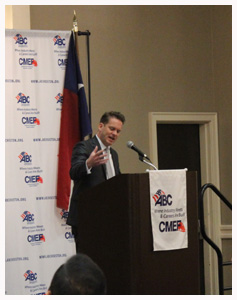 Richter then listed the following numbers from the ABC/CMEF Annual Report: “In 2017, there were 1,614 training units delivered solely for ABC and CMEF members and contributors. That’s an excess of 10,000 total being trained under CMEF sponsorship. This is not including high school students. On top of that there were 2,154 NCCER assessments administered, 544 practical exams, and 321 performance verifications. We also offered a variety of commercial classes, and we will continue to offer commercial classes and work with commercial members as well as C3 (the Construction Career Collaborative) and other groups who continue the efforts for commercial training and workforce development.”
Richter then listed the following numbers from the ABC/CMEF Annual Report: “In 2017, there were 1,614 training units delivered solely for ABC and CMEF members and contributors. That’s an excess of 10,000 total being trained under CMEF sponsorship. This is not including high school students. On top of that there were 2,154 NCCER assessments administered, 544 practical exams, and 321 performance verifications. We also offered a variety of commercial classes, and we will continue to offer commercial classes and work with commercial members as well as C3 (the Construction Career Collaborative) and other groups who continue the efforts for commercial training and workforce development.”
Richter asked that each member consider becoming more involved in CMEF with volunteer and financial support. “I urge you starting today if you are not involved or just simply not that familiar, to seek out a staff member, and we will walk you through it. Better yet, if you would like to connect with an engaged member, we will provide that connection for you. They will let you know how simple it really is and how far the benefits can go. … Why invest in training and workforce development as an industry? Because you are going to continue to build a skilled workforce which will then give you better quality, better productivity, reduce your wage escalations, drive down your cost structures, and you will be addressing the aging workforce as well. The industry needs to invest in community-based training and workforce development because together we are all training your current employees, we are training your future employees, and we are building the industry-wide pool of craft skilled professionals that will take you into the next level.”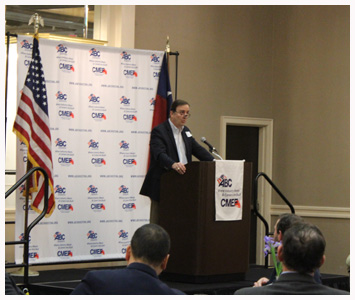 Spencer Moore, MD Anderson Cancer Center VP of Facilities Management, spoke about why the Construction Career Collaborative (C3) is important to MD Anderson. He said the first of two reasons is that they have almost one billion dollars in ongoing projects and plans for even more, so they need a sustainable, safe, and skilled workforce to construct their buildings. The other main reason they value C3 is for the availability of the skilled workforce needed for maintenance and operations of the buildings after they are in use. Moore gave an example of a recent chilled water pipe that needed emergency repair in one of their hospitals, and his appreciation of having contractors available that he could count on knowing that they would work while abiding by the three main principles of C3. Those principles require contractors to compensate their craft workers as employees with overtime and health benefits and to offer them craft and safety training to help their workers advance their careers. Moore said that he wants the craft trades to flourish and for young people to become excited to enter the construction industry to build their careers. As an owner, he wants jobsites to become safer. He believes that all of these objectives are supported through C3.
Spencer Moore, MD Anderson Cancer Center VP of Facilities Management, spoke about why the Construction Career Collaborative (C3) is important to MD Anderson. He said the first of two reasons is that they have almost one billion dollars in ongoing projects and plans for even more, so they need a sustainable, safe, and skilled workforce to construct their buildings. The other main reason they value C3 is for the availability of the skilled workforce needed for maintenance and operations of the buildings after they are in use. Moore gave an example of a recent chilled water pipe that needed emergency repair in one of their hospitals, and his appreciation of having contractors available that he could count on knowing that they would work while abiding by the three main principles of C3. Those principles require contractors to compensate their craft workers as employees with overtime and health benefits and to offer them craft and safety training to help their workers advance their careers. Moore said that he wants the craft trades to flourish and for young people to become excited to enter the construction industry to build their careers. As an owner, he wants jobsites to become safer. He believes that all of these objectives are supported through C3.
Moore pointed to some powerful results of recent projects built with C3 commitments. “Total manhours worked on 24 C3 projects: 7.2 million. OSHA reportable incidents: 20. Total project reportable incidents rates of 0.55, nearly six times better than the national average. Total lost time incidents: one. Total project lost time rate of 0.03 – that’s 60 times better than the national average for construction. And then there is C3 Safety Training attendees of almost 40,000 workers in 13 months. … Hopefully I have given you a little bit of perspective on why it’s important from an owner’s side on C3 and that we must have a safe and skilled and sustainable craft workforce.”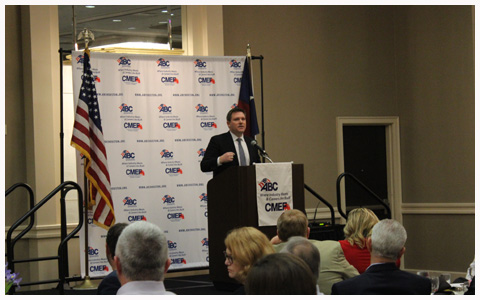 The next speaker was John Boerstler, Executive Director of NextOp, an organization that transitions military veterans into civilian industry careers in the Houston area. He shared that Houston has the second largest population of veterans in the United States, even though Houston does not have a large military installation. Boerstler said that the veterans come to Houston because of the economic opportunities and the companies that are interested in helping them transition into construction careers. He also said that Houston has the “fastest growing, post nine eleven veteran population in the United States.” He said that is important because it means these young veterans could be part of the solution for Houston’s aging workforce.
The next speaker was John Boerstler, Executive Director of NextOp, an organization that transitions military veterans into civilian industry careers in the Houston area. He shared that Houston has the second largest population of veterans in the United States, even though Houston does not have a large military installation. Boerstler said that the veterans come to Houston because of the economic opportunities and the companies that are interested in helping them transition into construction careers. He also said that Houston has the “fastest growing, post nine eleven veteran population in the United States.” He said that is important because it means these young veterans could be part of the solution for Houston’s aging workforce.
Last year, NextOp helped form a Veteran’s Subcommittee at CMEF, the only ABC committee of its kind in the United States that is dedicated to pipelining military talent into the construction industry. They have worked with NCCER to list 80 military jobs relating to construction and engineering and translate them into “civilian speak.” This is a huge step in not requiring veterans to complete training for skills they have already mastered, saving time and money and speeding up the transition process. Boerstler said that NextOp has put over 1000 veterans to work in the Houston area in the three years since they started. “Our retention rates are over 72 percent, which is unheard of in many of these industry sectors.” From the day veterans enroll in NextOp’s program to receiving their first paychecks is about 25 days, much faster than typical military to civilian job transitions. “We place on jobsites about a veteran and a half per day, thanks to your support,” Boerstler told the ABC members.
Next to speak was Mike Gremillion, vice president for ISC Constructors LLC, Houston Office. He serves on CMEF’s Industrial Workforce Development Council. Gremillion began by saying that his message might not be welcome, but that it was important. He said that ISC has been involved with CMEF and the Training Contributor Agreement (TCA) for many years because they “get it.” He said that ISC strongly believes in training their workforce and in the community training concept. He said that the TCA needs to become part of the culture for all contractors, not just the owners and larger subcontractors, only 10 percent of whom are currently participating in the agreements in Houston. He mentioned that ISC not only contributes $.06 per jobsite work hour as part of the TCA, but that they pay even more in contributions to NCCER to support that organization and others. He said that the TCA is an established tool to help contractors get affordable craft training for their employees. He said that the TCA is not just about money, it is about getting everyone’s workforce trained. Gremillion: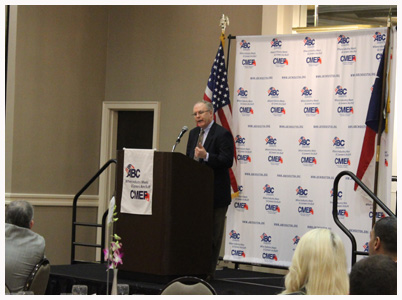 “Contractors, we simply should not rely on owners to fully fund the process. We are all familiar with the projected craft shortages for the next few years. As contractors we need to commit to training our workforce and realize the benefits of a community-based program such as the one CMEF can provide. … I hear all the time a thousand excuses for not getting involved: ‘We can’t afford to train,’ or ‘If we train people, they will leave.’ So, to borrow a phrase from Rusty Barnhill, I will leave you with this: ‘What are your results if you don’t train your people and they stay.’”
“Contractors, we simply should not rely on owners to fully fund the process. We are all familiar with the projected craft shortages for the next few years. As contractors we need to commit to training our workforce and realize the benefits of a community-based program such as the one CMEF can provide. … I hear all the time a thousand excuses for not getting involved: ‘We can’t afford to train,’ or ‘If we train people, they will leave.’ So, to borrow a phrase from Rusty Barnhill, I will leave you with this: ‘What are your results if you don’t train your people and they stay.’”
The final speaker of the day was David King, INEOS Olefins & Polymers USA Workforce Development Manager who is an active member of the PetrochemWorks steering committee. King explained that a few years ago, the East Harris County Manufacturers Association (EHCMA) wanted to do more to fill the skilled workforce shortage in the area, and they realized that the solution needed to include contractors as well as owners. They wanted to provide a “strong, qualified candidate pipeline for the industry.” King said that this is achieved by aligning and integrating owner and contractor communities through developing “best practice” recommendations for craft and safety training.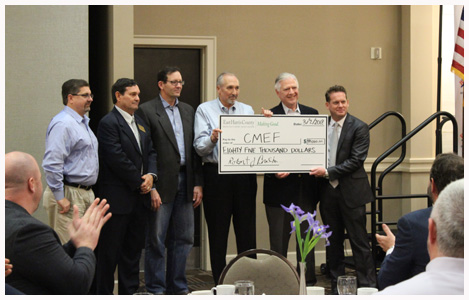 King said that the EHCMA Training Subcommittee has developed a Craft Progression Matrix which provides a roadmap that shows the steps needed to advance from an entry level position to a fully certified craft professional. King also mentioned PetrochemWorks and SteelToePro which are two different platforms that provide information about what types of jobs exist in the industry, where they are available, and how to apply for them.
King said that the EHCMA Training Subcommittee has developed a Craft Progression Matrix which provides a roadmap that shows the steps needed to advance from an entry level position to a fully certified craft professional. King also mentioned PetrochemWorks and SteelToePro which are two different platforms that provide information about what types of jobs exist in the industry, where they are available, and how to apply for them.
King ended his remarks with the following: “It has been said that the fate of nations depends on the education of youth. We should use this opportunity now, including support of CMEF and the TCA, to improve our region, to improve our nation, and also to make things better for our people. Thank you for your attention, and I would like to ask that when you leave here this morning, that you create a safe day for yourself and for others around you.”
The morning concluded with the presentation of a check to CMEF for $85,000 from the East Harris County Manufacturers Association to further the training of the communities skilled craft workforce.
Houston Industry Leaders Discuss Workforce Development at ABC/CMEF Breakfast
by Elizabeth McPherson | May 04, 2018


